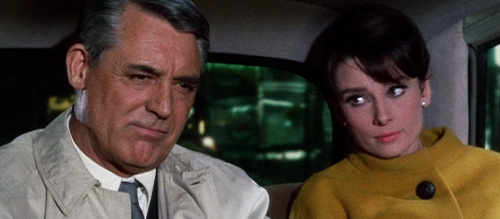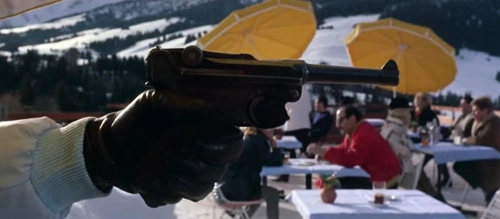Charade (1963) Review

Charade (1963)
Director: Stanley Donen
Screenwriter: Peter Stone
Starring: Cary Grant, Audrey Hepburn, Walter Matthau, James Coburn, George Kennedy, Dominique Minot, Ned Glass, Jacques Marin, Paul Bonifas, Thomas Chelimsky
Less than a month before Stanley Donen’s Charade was set to premiere, American President John F. Kennedy was assassinated. His death was one of the defining moments of the 60s that, along with the Civil Rights Movement and the sexual revolution, signaled the end of an era. Hollywood, too, was in the midst of its own metamorphosis. Although the slow motion collapse of the studio system began in 1948 with the Paramount Decision, it was the New Hollywood Movement of the mid-1960s that truly killed the Golden Age and ushered in a whole new kind of filmmaking.
You can feel the pulse of old Hollywood beating within Charade, living out some of its final moments in the screen images of Cary Grant and Audrey Hepburn, themselves icons of a time that was slowly slipping away. Often referred to as “the best Hitchcock movie Alfred Hitchcock never made,” Charade is part spy thriller, part rom-com; a film that straddles that transitional space between the old and the new, reminding us of a past we’d never get back, while also looking towards the future of what was to come.
In Charade, Audrey Hepburn’s Regina “Reggie” Lampert returns to Paris from her vacation in the French Alps to find her beautiful apartment empty and her husband, Charles, murdered. While Reggie was already planning to divorce Charles because she didn’t love him anymore, his death only creates more problems that it solves. After being summoned to the US Embassy by CIA administrator Hamilton Bartholomew (Walter Matthau), Reggie learns that her husband, during his time as a spy in WWII, stole quite a bit of gold from the US government, double crossing his co-conspirators in the process. Now, those same men are after the money, which Bartholomew insists that Reggie has. Aided by a handsome, yet increasingly suspicious American, Peter Joshua (Gary Grant), Reggie is in a race against the clock to find the missing funds before she ends up on the chopping block.
It’s indisputable that Charade shares many similarities with Alfred Hitchcock’s films, both stylistically and thematically, but the film has an awareness to it that veers into parody. Charade seems to be in conversation with Hitchcock, purposefully referencing his style, mostly for comedic effect. For instance, the film pokes fun at Hitchcock’s frequent use of famous landmarks when Reggie and Peter are walking along the Left Bank of the Seine and the camera suddenly pans up to reveal Notre Dome on the other side. “Uh, how’d that get there?” Grant asks, knowingly. This scene adds another layer of meta commentary when Reggie points out that where they’re walking is the same place that Gene Kelly danced with Leslie Caron in An American in Paris, perhaps in reference to Donen’s own musical legacy as both a choreographer and director of some of the most revered movie musicals of all time, like Singin’ in the Rain. Hitchcock’s love of the staircase to add suspense is also present, with the hilarious addition of an elevator running right through its spiral. Even Grant’s character’s ever changing identity feels like a spoof on one of the hallmarks of the suspense thriller, the plot twist.
This is not to say that Charade isn’t a proper thriller when it wants to be, though. The film might have a certain degree of awareness of its genre trappings, but that doesn’t stop it from using those tropes effectively, showcasing why the style works in the first place. There are moments of real horror and suspense throughout the film, like when one of the co-conspiritors Herman Scobie (George Kennedy) ends up drowned in the bathtub, his eyes wide and unmoving, or in the climactic scene when Peter stands under the stage and attempts to figure out where the killer is based on the sounds of his footsteps.
Donen and screenwriter Peter Stone handle Charade’s tonal shifts flawlessly. Its duality as both a comedy and a suspenseful mystery is evident from the very first frame. After an opening scene, where we witness Charles being thrown from a moving train, landing on the tracks with blood dripping down his face, we cut to the beautiful, snow covered mountains of the French Alps. We see Reggie eating lunch out on an open air deck and the camera pans away from her to reveal a gloved hand, pointing a gun directly at her. But as the mysterious figure pulls the trigger, water hits Reggie right in the face and it’s revealed that it’s only her best friend’s son, Jean-Louis (Thomas Chelimsky), having fun with a water gun. This subversive moment, juxtaposed with the gruesome one that comes before it, perfectly sets up the tone of the film as being equal parts hilarious and dangerous.

Because it’s a spy thriller, Charade also has moments where it feels like a James Bond movie (a film series that was in its infancy in the early 60s), especially in the way that it balances its more humorous and outlandish elements with its action and danger, as well as its infectious theme song and opening credits. In fact, title designer Maurice Binder also did the title design for 16 Bond films. Herman Scobie (George Kennedy), with his metal hook-like hand, invites comparisons to numerous disabled Bond villains and Cary Grant’s use of a thread from his sock to alert him if Reggie leaves her hotel room recalls a similar scene from Dr. No, which was released within months of Charade, when Bond (Sean Connery) slaps a single piece of hair to his closet doors to see if anyone opens them.
What is different about Charade, though, is that the film positions an elegant herione at the center of its mystery. Reggie is a fish out of water, thrust into an underworld of espionage, murder, and deceit, but Hepburn doesn’t just play her with a wide-eyed innocence. She infuses Reggie with intelligence, wit, and sophistication. With Hepburn’s grace and confidence, Reggie falls in love without ever losing herself. The film also makes good use of Hepburn’s comedic timing.
Charade is also notable for being one of Cary Grant’s final screen performances, as he retired from acting a few years later. Grant, who turned 59 during filming, had a feeling that the tide was turning and, not wanting to be pushed out of Hollywood, chose to leave instead. It is a shame, though, because aside from his grey hair and feeling a weariness that can only come with age, Grant is just as charismatic and swoonworthy as ever in this film. Even though his character is deceitful at nearly every turn, Grant imbues him with his signature charm that makes it impossible not to believe every word that comes out of his mouth, like placing your hand over an open flame because the thrill feels too good not to. When Reggie asks Peter if he knows what’s wrong with him, she tells him, with a smile, “Nothing.” Interestingly, Grant’s appeal as a romantic leading man is what got him cast in 1941 in his first Hitchcock picture, Suspicion.
Because Grant was uncomfortable with the age gap between he and Hepburn – she was only 34 – the script was rewritten to constantly reference it. This added yet another layer of meta-commentary since Hepburn spent the early part of her screen career romantically paired with much older leading men, including Fred Astaire who nearly 60 when he appeared with Hepburn in Donen’s Funny Face. Despite their age difference, Grant and Hepburn are a pitch perfect pair. Charade is a film that, on the surface, is about deception, the web of which grows more tangled and ludicrous as the story goes on, from the gun that’s really a water pistol to Peter’s every changing identity. The climactic scene even takes place deep in the bowls and upon the stage of a grand theater. But the real mystery of the film is the will-they-won’t-they romance between Reggie and Peter. Hepburn and Grant’s easy, magnetic chemistry gives the film a romantic sheen that sets it apart from other spy thrillers of the era. Take away the murder and mayhem, and Charade would still be one of the best rom-coms ever written.
Charade has it all: laughter, suspense, and a romantic pairing that makes us nostalgic for a bygone era of classic filmmaking. But Charade is much more than just whispers of the past. It points towards what movies would become in the years to follow, from spy thrillers to the romantic comedies of the late 80s and early 90s. It’s a film that mixes several different genres and still manages to come out whole, and should be mandatory viewing for anyone who wants to be thrilled and wooed at the movies.
Score: 24/24
Recommended for you: Alfred Hitchcock, Cary Grant: Cinema’s Greatest Collaborations

